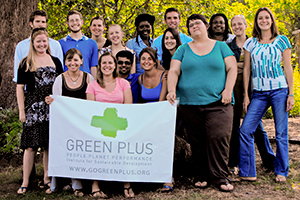
It's Not Easy Bein' Green
—but Fellows From the Green Plus Institute for Sustainable Development Are Here to Help
What do the Chapel Hill-Carrboro City School District, Chapel Hill Tire and Carrboro’s PTA Thrift Shop have in common? They are all examples of organizations that have been advised by fellows from the Green Plus Institute for Sustainable Development.
While some graduate students venture to other cities, counties and countries for summer internships and research, others stay local and contribute their knowledge and skills to the greater Chapel Hill area.
The Green Plus Institute for Sustainable Development is a nonprofit, collaborative effort between the University of North Carolina at Chapel Hill, Duke University, North Carolina State University, Elon University and a variety of other organizations, including chambers of commerce. Two of the Institute’s partners are UNC-Chapel Hill’s Center for Global Initiatives, and the School of Social Work. Funding to support the fellowships comes from many sources, including UNC-Chapel Hill’s Graduate School and Center for Global Initiatives, and Duke’s Nicholas School of the Environment. Executive Director Chris Carmody says that “the original vision behind the institute was to help smaller employers and their communities understand and benefit from triple bottom line sustainability.” The goal of the organization is to help small employers and their communities implement sustainable business practices, while also creating service-learning experiences for university students.
Carmody says that when selecting fellows, he and his team look for four main qualities in the applicants: the ability to communicate with and relate to different types of people, critical thinking skills, strong writing abilities, and a strong work ethic including self-motivation and time management skills. “We have had great success in finding those qualities in students from UNC-Chapel Hill,” Carmody says. “The Green Plus fellowship program is not a cookie-cutter program—students work on a variety of projects with a diverse group of clients.”

The 2010 Green Plus Summer Fellows, from left to right, back row: Jay Reno, Maz Felsher, Sarah Kate Fishback (staff), Karina Hilton Spiegel, Donna Daniels, David Shirk, Stacy Nagy, Solita Denard, Shana Starobin (staff), and Marissa Mitzner. Front row: Catherine Noyes, Kirsten Hausman (staff), Leigh Orne, Darshan Mundada, Jessie Margolis, and Alyssa Marturano.
Max Felsher, a master’s student in the School of Information and Library Science who expects to graduate this August, worked with Green Plus last summer. Felsher says that his experience helped him develop academically, while also providing a sense of personal accomplishment. Working with Green Plus “gave me a great chance to try out the skills I have learned in school. It was also exciting to work with people who are passionate about making the world a better place and witness first-hand how businesses are figuring out how to be environmental citizens,” Felsher says.
Darshan Mundada, a Rotary Peace Fellow who graduated from UNC-Chapel Hill last December with a master’s in social work, as well as a joint Certificate in Peace and Conflict Resolution from UNC-Chapel Hill and Duke University, also worked with Green Plus last summer. Mundada worked to establish new clients for Green Plus by working with the Chapel Hill-Carrboro Chamber of Commerce. He also worked on an independent project, “studying the feasibility of expanding Green Plus to India. I looked into international variants, Indian laws, contextual requirement and market feasibility that would help Green Plus if and when it expands internationally.”
Mundada says that working as a fellow with Green Plus “was one of the most rewarding experiences” he has had. “I experienced first-hand the intersection of corporate and nonprofit cultures in the U.S. The experience exposed me to the environmental awareness of small and medium-sized businesses. Being a student at the School of Social Work, it also provided me an opportunity to closely work with one of the prime movers of Green Plus, Professor Gary M. Nelson. My work with Green Plus helped me develop new perceptions of creating business models that are both lucrative and socially rewarding.”
The experiences of Felsher and Mundada affirm the mission of Green Plus. Carmody says that the fellows’ experiences are at the heart of the Institute’s mission to both “help small businesses, as well as help students learn across disciplines” to supplement their academic experiences.
To learn more about the Green Plus Institute for Sustainable Development, please visit www.gogreenplus.org.
♦ Rebecca Prettyman


